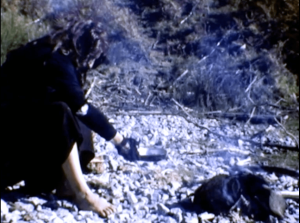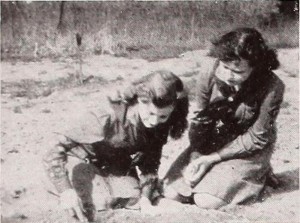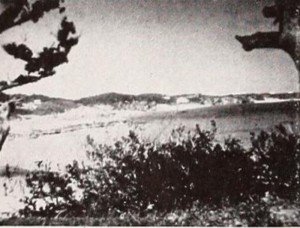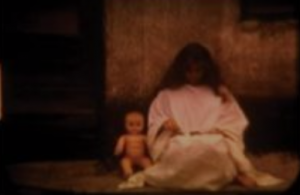
Una mujer camina por el paisaje entre ruidos. Hace fuego para calentarse un poco de comida pero un sonido la invade. Se encuentra con un soldado muerto dentro del bosque.
A woman walks through a landscape while noises are heard. She makes a fire to warm some food but a sound overcomes her. She finds a dead soldier inside the woods.
"This proved to be an unusual serio-comedy, telling of a restless young husband and how he was cured. It was very well acted by Alfred Fontana as the husband, Margaret Ervin as the vamp, Anne Howe, and Beatrice Traendly as the wife. The directon of Russell T. Ervin Jr. was remarkably good, revealing an unusual facility for telling a story concisely and quickly. Then too, he understood how to cover any histrionic imperfections of his cast. 'And How!' is a suprisingly neat amateur film" Photoplay, June. 1928, 66

"In As Ye Sow, Walter Bergmann has made a record of a Victory garden around the plot of the conscientious worker as contrasted to the indolent one. Mr. Shirker in his wishful thinking, through a dream sequence, takes the local prize for vegetables before the digging even begins. As the season progresses, Mr. Worker grows a fine garden, while his opponent achieves a harvest of weeds in spite of his bribes to helpers to produce his garden for him while he goes fishing. The players are well chosen and directed, and there is an amusing and well acted climax in which Mr. Shirker gets his inevitable just deserts." Movie Makers, Dec. 1944, 495.
"Dramatic short of a frumpy woman's dream of the alternate course her life might take were she a beauty." oldfilm.org
"a sogg. breve" short fiction
"Parabola, e La città sogna, regia di Guido Pallaro. Questi due film di Guido Pallaro hanno sopratutto un pregio: la buona volontà che dimostra l'autore, giovanissimo, di raggiungere qualche risultato adoperando tutti i mezzi possibili; passato questo periodo di esuberanza non esente da ingenuità stilistiche ed anche da arditezze ingiustificate, Pallaro potrà fornire opere di maggior impegno e più solida struttura. Nella Citta sogna che comprende i sogni di diversi individui il sogno del bambino ha qualche passaggio notevole, e in Parabola si avverte la ricerca di raggiungere nuovi motivi anche se i risultati non appaiono sempre realizzati con equilibrio."
"Parabola, and The City Dreams (La città sogna), directed by Guido Pallaro. These two films of Guido Pallaro have above all one merit: the good will that demonstrates their author, who is very young, to reach here some results using all possible means; having passed this period of exuberance not exempt from stylistic ingenuousness and also from unjustified daring, Pallaro has the capacity to provide works of greater commitment and more solid structure. In The City Dreams, which includes the dreams of various individuals, the dream of the child has some notable passages, and in Parabola one senses the search for new motifs even if the results do not always appear to be realized with balance."
— Il Ventuno 26 (Review of the G.U.F. of Venice) March 1935
"The Conscience is one of those psychological studies without being too psychological in its treatment and approach. A hit and run driver decides no one will know his crime, but he finds it hard to live with his conscience. Everywhere he looks he sees himself as judge and as prosecutor, finding himself guilty as he pleads for mercy. Photography is not the best, but the story is quite powerful" PSA Journal, Aug. 1967, 37.
A film about a mother who thinks her family has won a competition in their local newspaper. When a series of unfortunate events happen after, the mother is relieved to find out she was only dreaming.

"W. R. C. Corson, close friend of the late Hiram Percy Maxim, FACL, Founder of the Amateur Cinema League, and for several years an invalid, demonstrates his loyalty to the cause of personal filming and his determination to achieve in that field by a revision of travel footage made in a more active period. As its name might indicate. Elysium is a remembrance of happier days, containing sequences chosen for their beauty or evocation of delightful times, and haphazardly geographical. Scenes filmed from the air are interspersed with records of faraway places as Mr. and Mrs. Corson are seen wandering here and there. Here is the gallant and intrepid accomplishment of a pioneer movie maker who is still "in the game."" Movie Makers, Dec. 1944. 496.

"La cinta hacía un recuento de imágenes oníricas, en los que una mujer (Paloma Woolrich) sale de su casa para recorrer diversos espacios que en realidad parecen determinados por su imaginación: desciende los escalones de una calle en una zona peatonal, se muestra aprisionada por una roca gigantesca, aparece catatónica en una azotea con un bebé de plástico, lucha con un hombre contrahecho, apalea a un hombre amarrado, duerme con su pareja y su bebé de plástico en un cementerio, aparece desgreñada en una construcción en ruinas en medio del campo, donde es burdamente pintada por otra mujer" (Vázquez Mantecón, 2012)
"The film made a recount of dreamlike images, in which a woman (Paloma Woolrich, goes out of her house to go through several spaces that actually seem determined by her imagination: she goes down the steps of a street in a pedestrian area, then she is imprisoned by a gigantic rock, she appears catatonic on a roof top with a plastic baby, she struggles with a crooked man, she beats a tied man, she sleeps with her couple and her plastic baby in a graveyard, she appears disheveled in a construction site in ruins in the middle of the country where she is roughly painted by another woman" (Vázquez Mantecón, 2012).
"The combined efforts of Massimo Sani-photography and Ezio Pecora-directing. A slowly paced, sensitive portrayal of adolescent emotions. While in many amateur films the acting is such that we can never forget it is a movie and that the actors are aware of the camera, in "Encounter on the River", the acting is natural, making this tender, almost too subtle story most enjoyable. The best directed amateur film seen in years." PSA Journal, Dec. 1955, 36.
Total Pages: 5